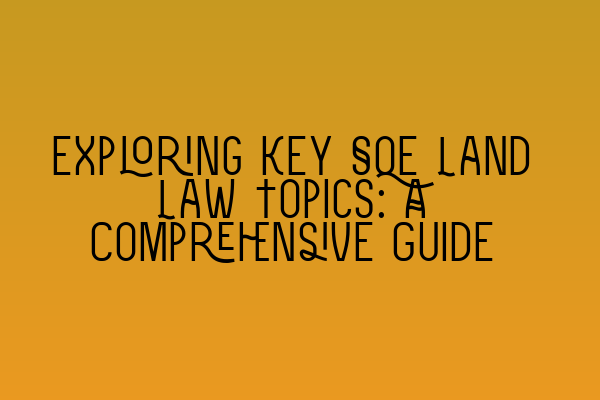Exploring Key SQE Land Law Topics: A Comprehensive Guide
Welcome to SQE Property Law & Land Law, your trusted source for comprehensive information on the key topics in the field of land law. In this guide, we will delve into the fundamental concepts, principles, and issues in land law to provide you with a solid foundation of knowledge. Whether you are a law student preparing for the Solicitors Qualifying Examination (SQE) or a legal professional seeking to expand your understanding, this guide is designed to equip you with the essential information you need.
The Scope of Land Law
Land law encompasses a wide range of legal principles and rules that govern the ownership, use, and transfer of land and property. It involves complex concepts, such as legal estates, equitable interests, and land registration systems. Understanding the key aspects of land law is crucial for anyone involved in property transactions, disputes, or developments.
Types of Land Ownership
One of the fundamental aspects of land law is the classification of land ownership. There are two main types of land ownership: freehold and leasehold. Freehold ownership grants the owner indefinite rights over the land, while leasehold ownership involves a lease agreement with specific terms and conditions.
Within the realm of land ownership, there are also various rights and interests, such as easements, covenants, and mortgages. These rights can significantly affect the use and enjoyment of land and must be carefully considered in any property transaction or dispute.
Land Registration
In the United Kingdom, land registration plays a crucial role in ensuring transparency and security in property ownership. The Land Registry is responsible for maintaining a register of all registered land and property titles. Understanding the land registration system is essential to ascertain the legal status and rights associated with a particular piece of land.
Trusts and Equitable Interests
In land law, trusts and equitable interests often come into play when legal and beneficial ownership of land are separated. Trusts are legal mechanisms that allow one party, known as the trustee, to hold and manage land for the benefit of another party, known as the beneficiary.
Equitable interests arise when a person has a right or interest in land that is recognized by equity but not necessarily by law. Understanding the principles of trusts and equitable interests is crucial in resolving disputes and ensuring fair outcomes in property-related matters.
Landlord and Tenant Law
Landlord and tenant law governs the relationship between landlords and tenants. It encompasses various aspects, such as the rights and responsibilities of both parties, rent agreements, lease termination, repairs and maintenance, and eviction procedures. Familiarizing yourself with the key principles of landlord and tenant law is essential for both landlords and tenants to protect their rights and interests.
Dispute Resolution
Property disputes can arise in various contexts, such as boundary disputes, adverse possession claims, or disagreements between landlords and tenants. Understanding the principles of dispute resolution, including negotiation, mediation, and litigation, is crucial for effectively resolving conflicts and achieving fair outcomes. It is important to seek legal advice and guidance to navigate through complex property disputes.
By exploring the key SQE land law topics covered in this comprehensive guide, you will develop a solid understanding of fundamental concepts and principles in land law. This knowledge will serve as a strong foundation as you progress in your legal career and navigate the complex landscape of property transactions, disputes, and developments.
For further insights into related areas of law, we recommend checking out these articles:
- Understanding Contractual Capacity: Rights and Limitations
- Interactive SQE Mock Tests for Contract Law: Test Your Knowledge
- Join Our SQE Contract Law Webinars: Expert Insights and Guidance
- Contract Law Reforms: An Analysis of Recent Changes
- Parties in a Contract: Rights and Responsibilities
We hope that this comprehensive guide has provided you with valuable insights into the key topics within SQE land law. Remember to continue exploring and deepening your understanding of this area of law to become a well-rounded legal professional.
